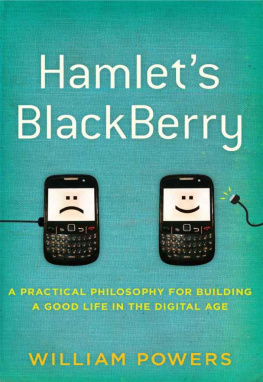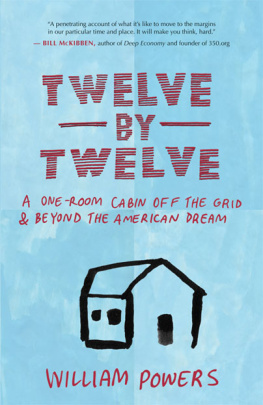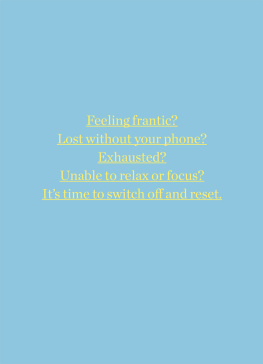Hamlets BlackBerry
A Practical Philosophy for Building a Good Life in the Digital Age
William Powers

For Ann Shallcross, who connected
This time, like all times, is a very good one, if we but know what to do with it.
Ralph Waldo Emerson
Contents
The Room
What Larks? The Conundrum of the Connected Life
Busy, Very Busy: In a Digital World, Wheres the Depth?
Hello, Mother: The Magic of Screens
Gone Overboard: Falling Out with the Connected Life
Solutions That Arent: The Trouble with Not Really Meaning It
Beyond the Crowd Teachings of the Seven Philosophers of Screens
Walking to Heaven: Plato Discovers Distance
The Spa of the Mind: Seneca on Inner Space
Little Mirrors: Gutenberg and the Business of Inwardness
Hamlets BlackBerry: Shakespeare on the Beauty of Old Tools
Inventing Your Life: Ben Franklin on Positive Rituals
The Walden Zone: Thoreau on Making the Home a Refuge
A Cooler Self: McLuhan and the Thermostat of Happiness
In Search of Depth Ideas in Practice
Not So Busy: Practical Philosophies for Every Day
Disconnectopia: The Internet Sabbath
Back to the Room
The Room
T ap, tap, tap, tap, tap, tap
Imagine youre in a gigantic room, a room so spacious it can comfortably hold more than a billion people. In fact, thats how many people are there with you right now.
Despite its size, the room is ingeniously designed so everyone is in close proximity to everyone else. Thus any person in the room can easily walk over to any other person and tap him or her on the shoulder.
As you move around the room each day, this is exactly what happens. Wherever you go, people come up to you and tap you on the shoulder. Some tap gently, some firmly, but they all want the same thing: a little of your time and attention.
Some ask you questions and wait for answers. Others request favors. There are people who are eager to sell you things and other people who want to buy things of yours.
Some share personal news and photos from their recent travels. Others want only to talk business. Occasionally someone taps to say they miss youwhich is a little odd, since theyre right there in the room with youand they give you big hugs and kisses. Certain friends tap often to keep you abreast of everything theyre thinking and doing, no matter how trivial. Im now eating a cheeseburger, one will say and hold it up for you to see.
Encounters often overlap. As youre dealing with one person, another comes along and taps, and you have to choose between them.
You do pretty well managing all these overtures, while also making your own. Its kind of thrilling to be in the room. Theres always something going on, and youre learning a lot. And some of these peoplemaybe twenty or thirty out of the billionreally matter to you. You make a point of tapping them as often as possible, and when they tap you back, it really feels nice.
Tap, tap, tap, tap, tap, tap.
So it goes all day and night. The enormous room is a nonstop festival of human interaction.
Like everyone else in the room, you have a personal zone where you eat, sleep, and hang out. Your zone is nicely furnished and quite comfortable. But it has no walls, and people seeking you out can come in at any time. If you happen to be asleep, they leave messages, sometimes labeling them URGENT . You find them when you wake up each morning, dozens of messages waiting for answers.
After a few years, you grow a bit tired of life in the room. Its getting exhausting, all this tapping. You crave some time away from all those other people, their needs and demands, and the strange pull that life in the room has on you.
So you decide to take a little vacation. Youll leave the room for a few days, go someplace where nobody can find you. You know exactly the kind of place it will be, too: fresh air, a big empty sky, no sound except the birds and the wind moving through the trees. Best of all, there will be no other people. Youll just sit by yourself and let your mind float free.
The more you imagine it, the more you cant wait to be there. Why didnt you think of this before?
You pack a small bag and head for the outer reaches of the room. After a short time, you come to one of the walls. Your eyes sweep its surface, searching for a door. There doesnt seem to be one, but the wall continues in both directions. For no particular reason, just a hunch, you turn left.
You walk on, following the perimeter of the room while watching carefully for an exit. As on any other day, people come over frequently and tap you. Theres a new tap every few minutes.
After responding to each ones comment or query, you ask if they can direct you to the nearest door out of the room. You do this over and over, but nobody offers any helpful information. Most say they dont know of any doors and apologize that they cant help.
A few seem mildly put off by your question. They stare directly into your eyes for the briefest moment, as if youre a puzzle theyd like to solve.
Only one person, a young woman wearing a straw hat, seems truly happy you asked the question.
A door? she says. I cant believe you asked me that. Ive been wondering the same thing for years. If you find one, will you tap and let me know? Id give anything to go outside for an hour.
You begin to ask what makes her say that, but before you can finish, shes interrupted by another woman tapping her from behind.
Good luck! she says, with a sweet smile and a wave. Dont forget me!
You continue walking. Hours go by, and still no door. This is strange. Before you moved to the room, taking off used to be so simple. When you were a kid, your parents would pile the whole family in the car and drive out to the lake. Youd spend two weeks together there in an old cabin and not hear from anyone.
After college, when you were living in the city, you used to get away almost every weekend, grab a friend and head down to the beach or up to the mountains. It wasnt complicated. Anyone could do it.
Finally, just when youre about to give up, you come to a large hole in the wall. There are people milling around nearby, but theyre all turned away from the hole, as if they dont know its there or know and dont care.
Its not exactly a door. Its an arch-shaped opening about ten feet high by four feet wide, with a ledge running along the bottom at about thigh level. The ledge is deep and flat, perfect for someone to sit on and contemplate the view. Theres nobody sitting on it now.
You peer outward. The view isnt what you imagined. You expected mountains and broad valleys with roads winding lazily through themthe vistas of happy vacations. But all you can see is a black backdrop decorated with tiny white twinkle lights, like the lights people in the room string on their Christmas trees for the holidays.
After a few minutes your eyes adjust, and you realize those arent twinkle lights at all. Theyre stars! Youre looking out into space, the cosmos. It seems the room has broken free of the earth, the way a huge chunk of ice occasionally breaks off a glacier and floats away on its own. You remember reading about this once. They say the glacier has calved. What do they say when it happens to a big room filled with people?
Your options are clear. You can turn around and go back to your personal zone, or you can step through the arch and see what happens.
The latter course is risky. Will you be able to breathe out there? Will you float pleasantly away from the room, or will it feel scary, more like falling?














